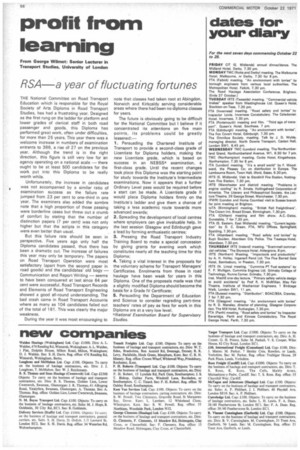profit from learning
Page 58

If you've noticed an error in this article please click here to report it so we can fix it.
From George Wilmot: Senior Lecturer in Transport Studies, University of London
RSA a year of fluctuating fortunes
THE National Committee on Road Transport Education which is responsible for the Royal Society of Arts Diploma in Road Transport Studies, has had a frustrating year. Designed as the first rung on the ladder for platform and lower grades of clerical staff in both road passenger and goods, this Diploma has performed great work, often under difficulties, for more than 25 years. This year there was a welcome increase in numbers of examination entrants to 386, a rise Of 27 on the previous year. Although the trend is in the right direction, this figure is still very low for an agency operating on a national scale there ought to be at least 500 candidates for the work put into this Diploma to be really worth while.
Unfortunately, the increase in candidates was not accompanied by a similar ratio of examination success as the failure rate jumped from 23 per cent to one-third in one year. The examiners also added the sombre note that a high proportion of those passing were borderline cases but threw out a crumb of comfort by stating that the number of distinction papers 17 per cent) was not only higher but that the scripts in this category were even better than usual.
But this failure rate should be seen in perspective. Five years ago only half the Diploma candidates passed, thus there has been a dramatic cut. The increase of failures this year may only be temporary. The papers on Road Transport Operation were most satisfactory (apart from the second paper in road goods) and the candidates' old bogy Communication and Report Writing seems to have been conquered at last since 64 per cent were successful. Road Transport Records and Elements of Road Transport Engineering showed a good all-round understanding. The bad crash came in Road Transport Accounts where as many as 104 candidates failed out of the total of 181. This was clearly the major weakness.
During the year it was most encouraging to note that classes had taken root at Abingdon, Norwich and Kirkcaldy serving considerable areas where there had been no diploma classes for years.
The future is obviously going to be difficult for the National Committee but I believe if it concentrated its attentions on five main points, its problems could be greatly lessened:
1. Persuading the Chartered Institute of Transport to provide a second-class grade of Licentiate for Diploma holders, making the new Licentiate grade, which is based on success in an NEBSS* examination, a first-class grade. Until the recent changes took place this Diploma was the starting point for study towards the Institute's Intermediate examinations. Now it appears that a further Ordinary Level pass would be required before a start can be Made. A Licentiate grade II would place Diploma holders firmly on the Institute's ladder and give them a chance of taking a less academic route towards more advanced awards; 2. Spreading the development of local centres where employers can give invaluable help. In the last session Glasgow and Edinburgh gave a lead by forming enthusiastic centres; 3. Pressing the Road Transport Industry Training Board to make a special concession by giving grants for evening work which constitutes nearly all the teaching time for this Diploma; 4. Taking a vital interest in the proposals for the voluntary scheme for Transport Managers' Certificates. Enrolments from those in road haulage have been weak for years in this Diploma. One of the proposals made was that a slightly modified Diploma should become the basis for a Grade IV Certificate; S. Persuading the Department of Education and Science to consider regrading part-time teachers' rates of pay as fees for work in this Diploma are at a very low level.
*National Examination Board for Supervisory Studies.








































































































